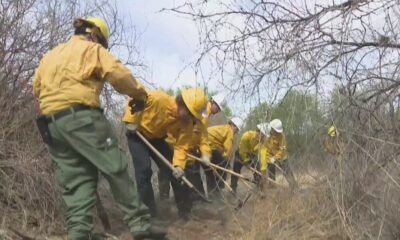Business
Native American Traditional Healing Practices Gain Medicaid Coverage in 4 States, Arizona Among Them

Native Americans in Arizona, along with their counterparts in California, New Mexico, and Oregon, will soon have access to government health coverage for traditional healing practices. The Biden administration announced this development on October 16, unveiling expanded Medicaid and Children’s Health Insurance Program (CHIP) benefits under demonstration amendments to section 1115 of the Social Security Act.
Health and Human Services Secretary Xavier Becerra emphasized the cultural significance of these practices for American Indian and Alaska Native populations. “Traditional health care practices have been vital for many communities. Too often, health insurance does not cover them. We are extending access to culturally appropriate, quality health care in Tribal communities,” he explained.
In Arizona, eligibility extends to traditional health-care practices delivered through the Indian Health Service (IHS) or tribal-operated facilities. Notably, Medicaid coverage will also reach Urban Indian Organizations, nonprofit entities serving Native Americans and Alaska Natives, unlike in the other states.
These government programs aim to alleviate health care costs for low-income individuals and families. Medicaid offers low-cost or free health coverage, whereas CHIP focuses on children outside of Medicaid eligibility but lacking insurance through family plans. Coverage specifics may vary by facility and could encompass treatments such as sweat lodging and music therapy.
The Arizona Health Care Cost Containment System (AHCCCS) first proposed covering these services in 2015. Originally denied, the request gained traction following a newly established policy framework released this year by the Centers for Medicare & Medicaid Services (CMS). This framework guarantees a 100% reimbursement match for traditional healing practices.
Health disparities affecting Native Americans in Arizona have long been an issue. Reports highlight predatory rehab facilities that exploit Native Americans, luring them to unsafe sober living setups. Last year, Arizona Attorney General Kris Mayes initiated an investigation with the FBI into these fraudulent operations.
Beyond exploitation, Native Americans face significant health challenges, including heightened rates of diabetes, cardiovascular diseases, and obesity. Substance abuse and suicide rates among this demographic also exceed those of other ethnic groups in the U.S. A 2022 report noted that suicide ranked among the leading causes of death for young non-Hispanic American Indians and Alaska Natives.
Historical and ongoing trauma has compounded these disparities. The U.S. government’s past actions, including forced relocations and the near-eradication of essential food sources, have inflicted lasting psychological and physical ramifications. Tribal leaders believe incorporating traditional healing practices could bridge significant health gaps.
Navajo Nation President Buu Nygren remarked on the significance of this approval, stating, “This reflects the understanding that health is more than physical; it is spiritual, emotional, and culturally vital. Traditional healing will be more accessible, providing holistic care for our people.”
Many traditional Native American healing practices, such as sweat lodges, are documented to offer various health benefits, including pain relief and detoxification. Such treatments may serve as vital resources in addressing substance abuse issues within these communities.
CMS Administrator Chiquita Brooks-LaSure stated, “By strengthening access to traditional health care practices, these innovative state demonstrations can play a crucial role in reducing health disparities.” The Phoenix Indian Medical Center (PIMC), the largest IHS facility in the Phoenix area, already provides health services to over 150,000 individuals, integrating both medical and spiritual care.
PIMC CEO Deb Ward Lund noted the center’s unique position in serving a diverse patient population while advocating for spiritual care advancements as a result of the new coverage. However, this initiative is a pilot program set to be reviewed over the next few years, with an expiration date of September 30, 2027, unless extended.
IHS Director Roselyn Tso emphasized the importance of preserving traditional healing knowledge, noting its role in sustaining health and wellness in Native communities. Her insights underscore the promise this initiative holds for improving the overall well-being of Native Americans through the integration of culturally significant healing practices.


















